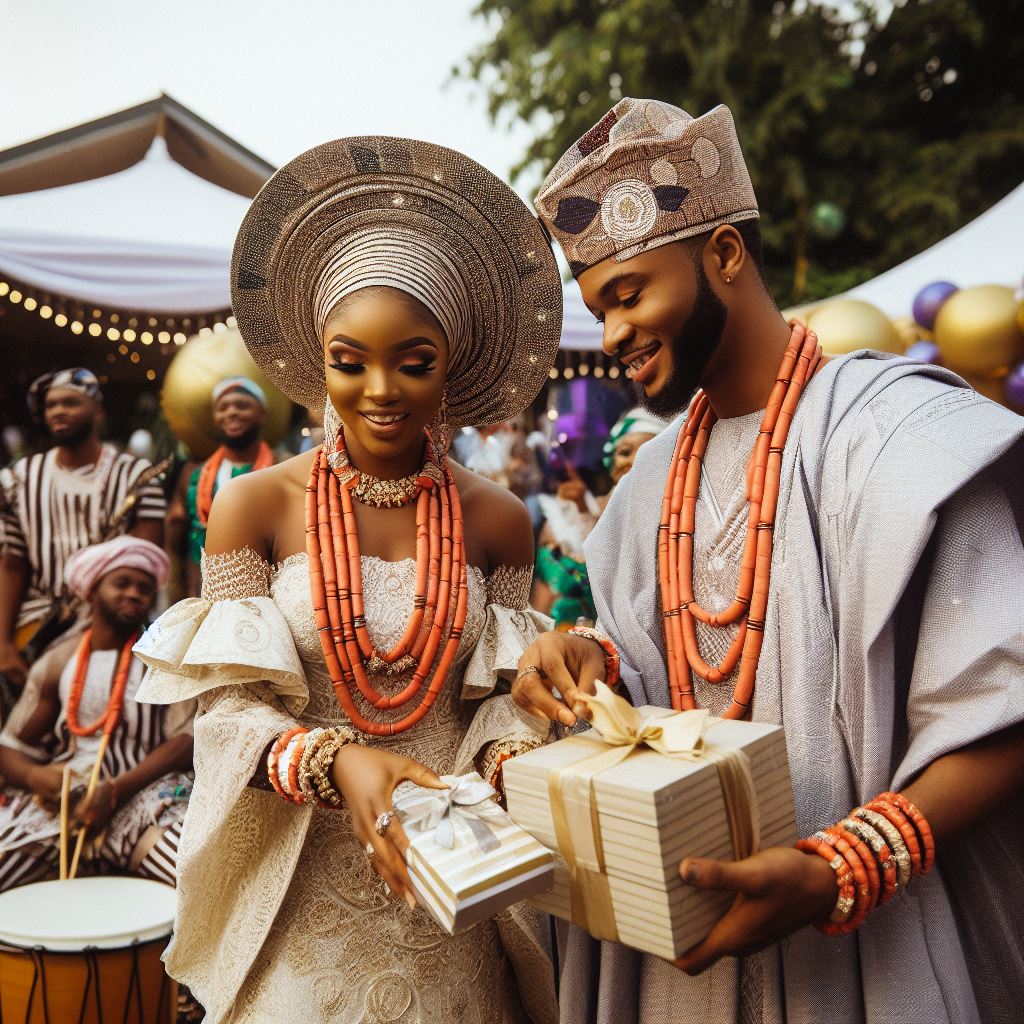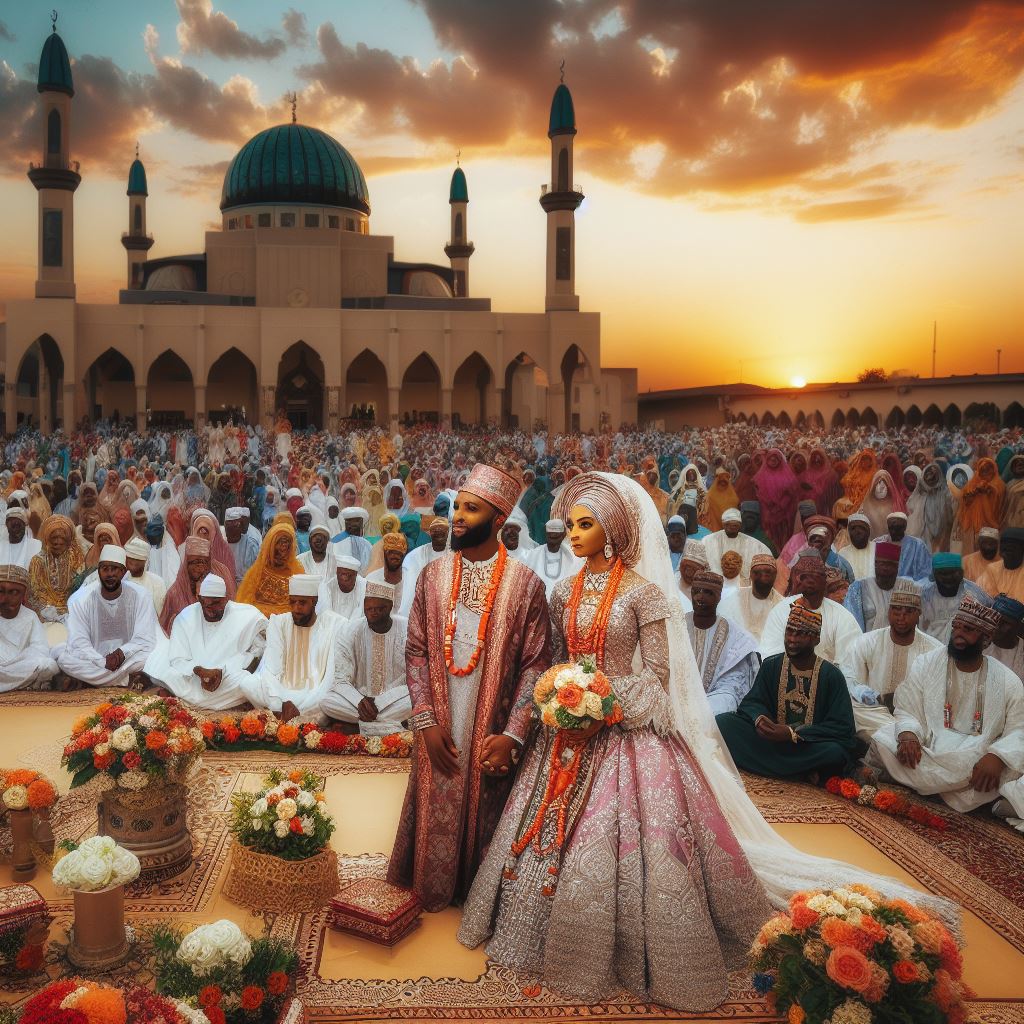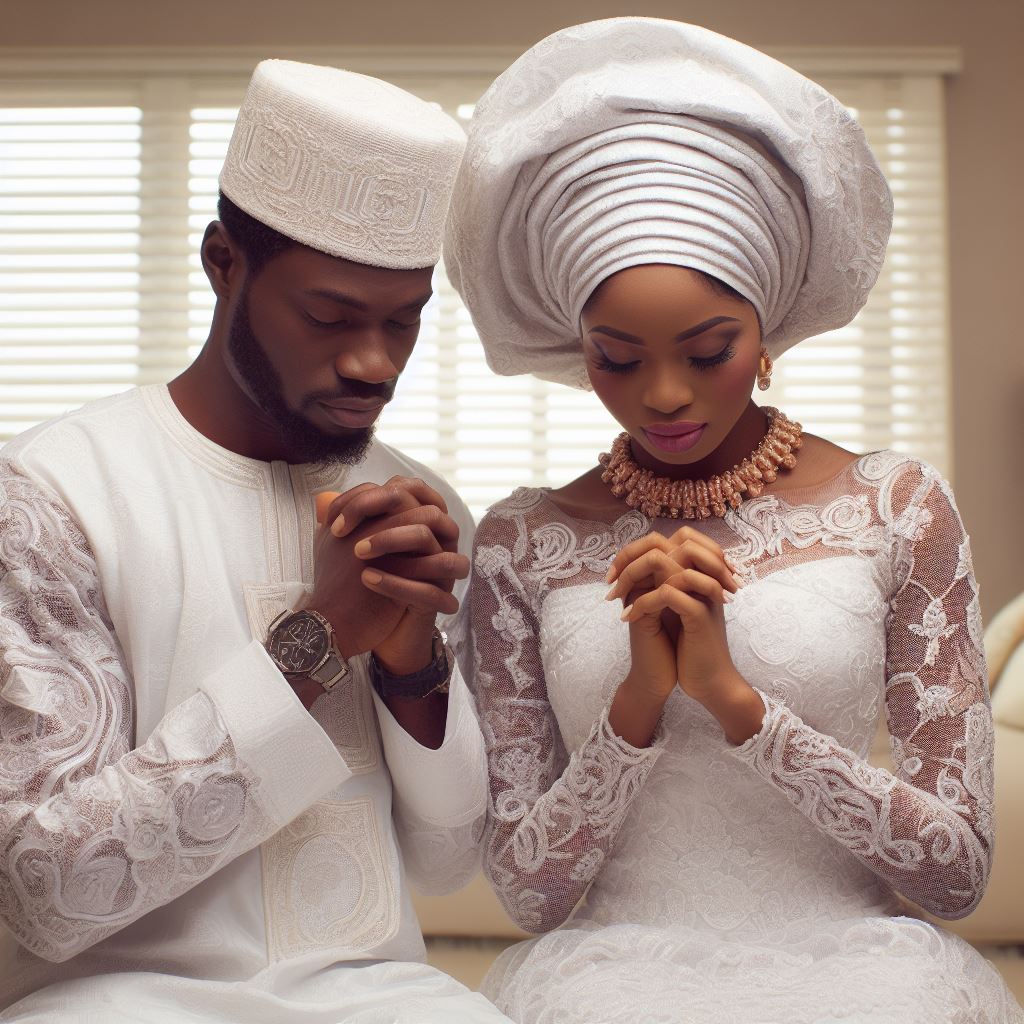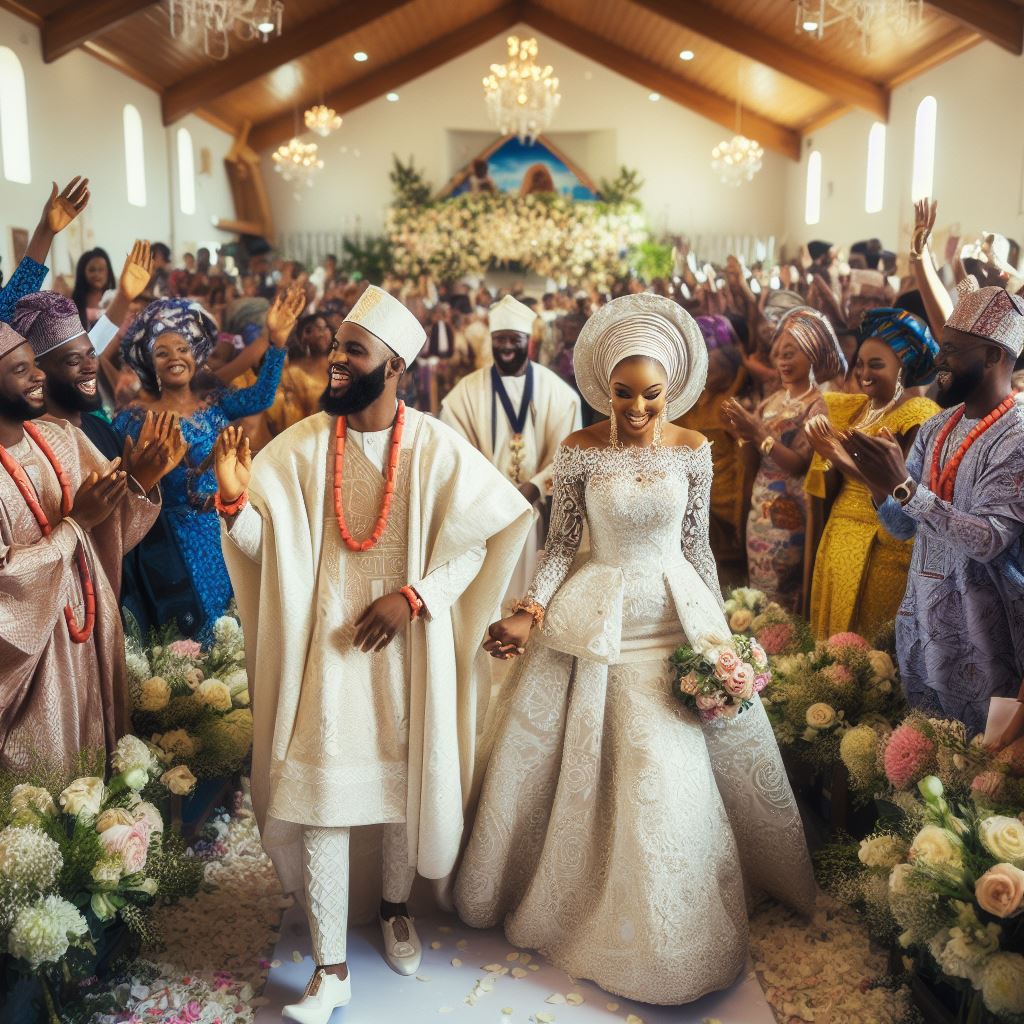Introduction
Overview of Nigerian Marriage Customs
Within the tapestry of Nigerian culture, traditional marriage customs stand as vibrant threads, weaving together history, tradition, and identity.
Importance of Understanding Customs
Embarking on this exploration isn’t merely an appreciation of tradition; it’s a journey to the core of Nigerian heritage.
Traditional customs encapsulate the values, beliefs, and aspirations of diverse Nigerian communities.
Understanding them isn’t just an academic exercise; it’s an invitation to dive deep into the soul of Nigeria.
These customs bind generations, bridge communities, and celebrate the essence of being Nigerian. By delving into these customs, we unearth the wisdom of ancestors and the resilience of a nation.
Join us on this captivating journey as we unravel the intricate tapestry of traditional Nigerian marriage customs, where love, tradition, and culture intertwine to form the vibrant mosaic of Nigeria’s rich heritage.
Pre-marriage customs
Courtship rituals
- Introduction through family and friends.
- Courtship period and expectations.
- Importance of parental approval.
Courtship rituals play a vital role in traditional Nigerian marriage customs.
It is the period when potential partners get to know each other, their families, and decide if they are compatible for marriage.
Introduction through family and friends
Traditionally, courtships were initiated through family and friends.
Parents would introduce their sons and daughters to potential partners based on compatibility and shared values. This ensured that both families were involved from the start.
Courtship period and expectations
The courtship period is a time for the couple to build a strong foundation and deepen their bond.
It allows them to learn about each other’s values, goals, and interests. During this time, they should be open and honest, as trust is essential in Nigerian marriages.
Importance of parental approval
Parental approval holds significant importance in Nigerian culture. Before proceeding with the marriage, both partners must receive blessings from their parents.
This is done to ensure that the union is supported and accepted by the families.
Traditional engagement
- Exchange of gifts and dowry ceremonies.
- Significance of dowry in Nigerian culture.
- Role of families in negotiation and agreement.
Traditional engagement is a crucial step in the journey towards marriage in Nigeria. It involves the exchange of gifts, negotiation of dowry, and the formal agreement between the families.
Exchange of gifts and dowry ceremonies
During the traditional engagement, both families exchange gifts as a symbol of their willingness and commitment to the union.
Additionally, a dowry ceremony takes place, where the groom’s family presents gifts and financial offerings to the bride’s family.
Significance of dowry in Nigerian culture
Dowry holds immense cultural significance in Nigeria. It represents the groom’s appreciation for the bride’s family and demonstrates his ability to provide for her.
The dowry is a token of respect and symbolizes the union of two families.
Role of families in negotiation and agreement
The families of the couple play a crucial role in the negotiation and agreement process. They discuss and agree upon the dowry amount, the wedding date, and other important aspects of the marriage.
This emphasizes the collective aspect of the union and reinforces the importance of family bonds.
Pre-marriage customs in Nigeria are rich in tradition and hold significant importance.
Courtship rituals and traditional engagement ceremonies create a strong foundation for successful marriages by ensuring compatibility, trust, and family involvement.
These customs reflect the values and cultural heritage of the Nigerian people.
Read: A Lifelong Bond: Inspirational Bible Verses on Marriage
Wedding ceremony customs
Traditional wedding attire
- Description of traditional Nigerian attires
- Symbolism and cultural significance of attire
- Regional variations in wedding attire
Traditional wedding rituals
- Ceremony location and setup
- Processional and ceremonial protocol
- Rituals and traditions performed during the ceremony
The Traditional wedding reception
- Festive atmosphere and celebration
- Traditional dances and music
- Importance of communal support and participation
Couples often personalize their receptions to reflect their own unique style and values while incorporating meaningful customs from their cultural or regional heritage.
Read: Navigating Marital Challenges: Guidance from the Bible
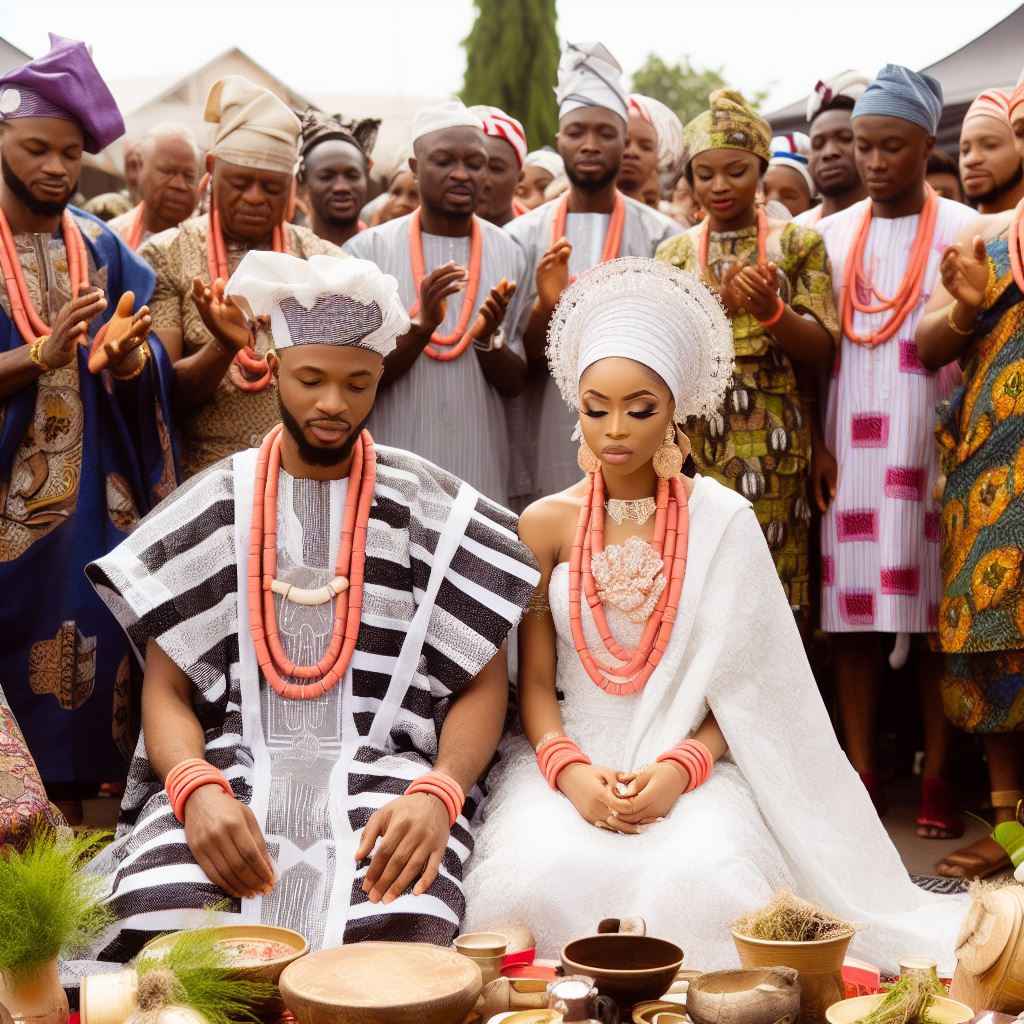
Post-wedding customs
After the joyous celebration of a traditional Nigerian wedding, several post-wedding customs are observed. These customs signify the continuation of values, blessings, and family unity.
Post-wedding rites and rituals
The first post-wedding custom involves seeking the blessing and approval of elders and family members.
The newly married couple pays homage to their elders, seeking their blessings for a prosperous and harmonious married life.
In addition to seeking blessings, symbolic actions and rituals are performed after the wedding.
These actions vary across different Nigerian communities but are intended to bring good luck and happiness to the newlyweds.
One such symbolic action may involve breaking kolas (a type of nut) together, symbolizing the couple’s shared responsibilities and commitment to their marriage.
Other rituals may include the presenting of gifts or the sharing of a meal with family and friends.
The significance of maintaining family unity is emphasized during these post-wedding customs.
Symbolizes the couple’s commitment to honoring their families and upholding the values and traditions passed down through generations.
Role of extended family
Extended family members play a significant role in the post-wedding customs.
They exert influence and become actively involved in the lives of the newlyweds, offering guidance and support as they embark on their journey together.
Elders within the extended family act as advisors, providing wisdom and counsel to the newly married couple.
Their experience and knowledge help navigate the complexities of married life and ensure a strong foundation for the relationship.
Understanding familial expectations and responsibilities is crucial for the newlyweds.
Extended family members provide guidance and help them adjust to their new roles as spouses within the family structure.
Through post-wedding customs, traditional Nigerian marriages emphasize the importance of family, unity, and respect for elders.
These customs strengthen the bond between families, instill values, and ensure the couple’s successful integration into their new married life.
Read: The Role of Husbands & Wives: Exploring Ephesians 5
Contemporary changes and challenges
Influence of modernization on traditional customs
- Impact of Western culture and globalization
- Balancing traditional customs with modern values
- Adapting customs to fit changing societal norms
Cultural and generational differences
- Conflict between traditional and modern mindsets
- Addressing intergenerational tensions
- Importance of cultural preservation and understanding
Additionally, it’s essential to avoid stereotypes and recognize the wide range of individual variation within cultural and generational groups.
Read: God’s Plan for Marriage: Rooted in Biblical Scriptures
Conclusion
Recap of Traditional Nigerian Marriage Customs
Traditional Nigerian marriage customs are deeply rooted in the country’s rich cultural heritage.
These customs typically involve elaborate ceremonies and rituals that signify unity and blessings for the couple.
Key elements of Nigerian marriage customs include the payment of dowry, traditional rites, and the involvement of families and communities.
Significance of Preserving and Appreciating Cultural Heritage
Preserving and appreciating cultural heritage is essential for maintaining identity and a sense of belonging.
By understanding and engaging in traditional Nigerian marriage customs, individuals can better connect with their roots and cultural history.
It also fosters a sense of unity and strengthens the bond between individuals, families, and communities.
Call to Continue Learning about and Respecting Traditional Customs
It is crucial to continue learning about and respecting traditional customs to ensure their preservation.
By educating ourselves and others on Nigerian marriage customs, we can promote cultural diversity and celebrate the beauty of different traditions.
Respecting and embracing traditional customs also paves the way for cross-cultural understanding and appreciation.
Traditional Nigerian marriage customs hold immense significance in the country’s cultural fabric.
By preserving, appreciating, and respecting these customs, we can honor the past, celebrate the present, and ensure a vibrant future for Nigerian cultural heritage.

